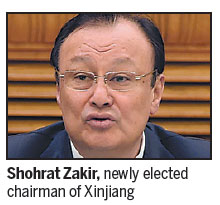Eliminating estrangement and improving understanding among people from different ethnic groups in the Xinjiang Uygur autonomous region are crucial to the future of the region and China, the chairman of the region said.

"Ethnic unity is key to solving the problems in Xinjiang and it also plays a special and significant role in China," said Shohrat Zakir, the newly elected chairman of Xinjiang, during an exclusive interview with China Daily.
The region is home to people of more than 13 ethnic groups, and Uygurs make up more than 46 percent of its population.
Shohrat, 61, was voted in as the chairman of the region by the deputies to the 12th Xinjiang Regional People's Congress in the regional capital of Urumqi in January.
Zhang Chunxian, Party chief of the region, said last year that the riot in Urumqi in July 2009 that left 197 dead had created ethnic conflicts that linger.
Shohrat said, "We will speed up the process of building mixed communities in which people from different ethnic groups can live together and learn from each other."
Aziz Musar, commissioner of southern Xinjiang's Hotan prefecture, said: "Promoting mixed communities is one of our main tasks in 2015. For example, we will encourage Han Chinese businessmen and those from ethnic groups to open shops on the same commercial streets instead of having different quarters."
Xinjiang also plans to mix together students from different ethnic groups in the same classes in primary and high schools, he said. Currently, Xinjiang has separate schools for Han Chinese and ethnic students.
"The Xinjiang regional legislature will also draft a regulation on promoting ethnic unity and severely punish those who sabotage ethnic unity, in accordance with the law," Shohrat said.
All ethnic-related affairs must be handled in accordance with the law, he said.
"People have to know that no matter which ethnic group they are from or what religion they follow, they are Chinese residents who must obey the law. All demands or desires must be pursued in a lawful way."
This year marks the 60th anniversary of the founding of the autonomous region, which has undergone enormous changes.
"Some elderly Uygurs in southern Xinjiang who once lived in mud houses said it took them a long time to get used to the new brick houses," Shohrat said. "They cannot believe the changes."
The region's achievements didn't come easily, because it has always been China's front line of combating terrorism and religious extremism. The solution to those problems is to handle them in accordance with the law, Shohrat said
Xinjiang will work on drafting regulations to eliminate religious extremism, control the Internet and curb the spread of videos and audios with content of terrorism and religious extremism, he added.
"I am very proud of being the new chairman of Xinjiang," Shohrat said. "At same time, I feel the heavy responsibilities on me."
cuijia@chinadaily.com.cn
Related Stories